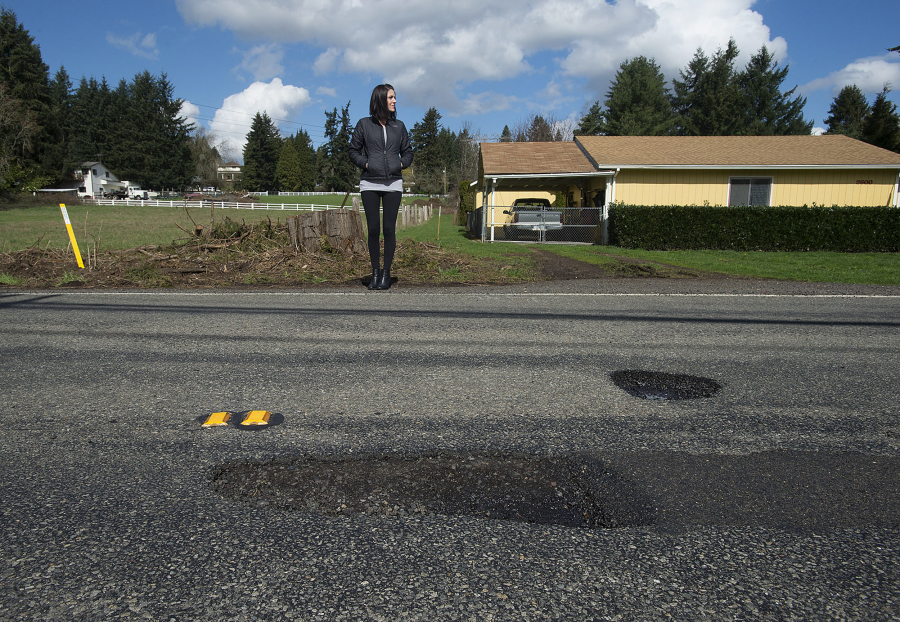Teresa Eldred drives the same stretch of Northeast 68th Street nearly every day, but early last month there was no way she could have avoided the pothole that formed along one particular stretch.
Between the road’s small shoulder and the oncoming traffic, Eldred said, she tried to steer clear of the pothole, but the left back wheel of her Jeep Grand Cherokee dropped into it.
She said the tire made a loud noise as it blew out, and the impact caused the airbag light in her car to go off.
“I’ve never had a flat tire like that; I’ve never blown out,” she said. “It was really scary.”
She also said she remembers thinking that there was no way the county could deny the claim she filed against it, asking that she be compensated for the $469 it cost to replace the tire and repair her damaged wheel.
But the county did deny Eldred’s claim. And she’s not alone.
Asphalt-blistering snow and ice has caused numerous potholes on the roads managed by the city of Vancouver, Clark County and the Washington State Department of Transportation this winter.
In Washington, if you think a government entity has caused you an injury or damaged your property because of its negligence, you can file a tort claim against it to recoup damages. But if you’ve tried filing a claim against the city of Vancouver, Clark County or WSDOT after a pothole on one of their roads damaged your vehicle, you’re unlikely to get reimbursed.
Between December and February, the city of Vancouver, Clark County and WSDOT denied almost all of the pothole claims filed against them, according to a review of records by The Columbian.
WSDOT spokesman Bart Treece said the agency’s top priority is operating and maintaining safe roads. Similarly, the county and city of Vancouver encourage people to report potholes, which are fixed as part of ongoing maintenance.
“If there is a known adverse roadway condition, the agency has an obligation to warn the traveling public or make repairs within a reasonable amount of time,” he wrote in an email. “For each claim submitted, WSDOT conducts an investigation to examine the relevant facts before making a determination of liability.”
Between December and February, seven people filed claims against WSDOT for pothole damage. Only one person got a settlement, three were denied and the final three were still pending.
During that time period, the city of Vancouver received three claims for motorists requesting compensation for damage incurred to their vehicles from potholes. The city responded by pointing out that the roads where the incidents occurred are in the county.
During that same time period, the county received six claims for pothole-related damage, all of which were denied.
Ben Shafton, a Vancouver attorney, has represented clients suing local governments over potholes in the past. For the average person, he said, it’s very rarely worth the effort.
People can file a damages claim against the state or local government when their car is damaged by a pothole, but Shafton said they’re usually not successful.
“It’s rare, in my experience, that any governmental agency will pay on a claim without the person filing a lawsuit,” he said.
Hard to prove
Suing the government is an option, but it’s difficult to prove the government failed to reasonably maintain the road.
To start with, there are a lot of variables at play. For example, potholes can form and expand very quickly on stretches of road that might have been months away from a scheduled inspections. Proving that the road department was negligent between the time it formed and was repaired is an onerous task, Shafton said.
Beyond that, hiring an attorney is not cheap, and even if a person wins, they’re likely to have spent much more time and money going through court than the damage to their car was worth.
“If you win, you’ve lost,” he said.
“By the time the person has pursued the claim, the person would probably have been better off by going to his or her automobile collision or comprehensive coverage and getting the damage taken care of there,” Shafton said.
Clark County Risk Manager Mark Wilsdon didn’t respond to a request for comment. Susan Lindahl, liability administrator for the city of Vancouver, said that the claim process for local governments is basically the same. If someone files a claim, which she said there is no cap on, the city or county will conduct an investigation to determine if they are responsible for the damages and will pay part or all of the claim if it’s determined they are responsible. If the claimant isn’t satisfied, they can file a lawsuit, she said.
When it comes to potholes, she said the government entity responsible needs to have had proper notice of the problem and opportunity to fix it. Because potholes can pop up suddenly after wintry weather, it’s hard for the jurisdiction to receive notice and fix them before a motorist runs into it, she said.
“Without notice and opportunity, typically the claim will be denied,” she said.
On Feb. 28, Eldred received a letter from Wilsdon denying her claim. The letter noted that the county didn’t have proper notice and that Eldred should have driven slower.
The response left Eldred unsatisfied. She didn’t recall her exact speed but estimated it to be about 20 mph.
“When something goes wrong, you take care of your car, but when it’s caused by damage in the road, it’s kind of unnerving,” she said.





